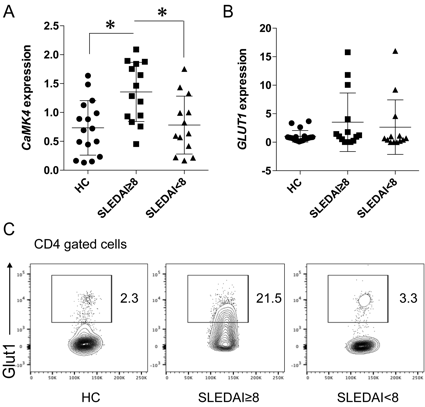Session Information
Date: Sunday, October 21, 2018
Title: T Cell Biology and Targets in Autoimmune and Inflammatory Disease Poster
Session Type: ACR Poster Session A
Session Time: 9:00AM-11:00AM
Background/Purpose: Glycolysis is critical for T-cell effector functions, and increased glycolysis leads to autoimmunity. APT production by effector T cells is dependent on the mitochondria-independent glycolysis system. In addition, the expression of GLUT1, a major glucose transporter, is enhanced upon the activation of T cells.
We sought to clarify the significance of immunometabolism in the pathological condition of systemic lupus erythematosus (SLE) and to determine the effect of calcium/calmodulin-dependent protein kinase 4 (CaMK4) on T-cell metabolism.
Methods: We performed metabolomic profiling using capillary electrophoresis mass spectrometry in naive T cells from MRL/lpr mice treated with anti-CD3/28 antibodies in the absence or presence of a CaMK4 inhibitor (KN-93). We examined the expression of GLUT1 and CaMK4 in CD4+ T cells from healthy controls (HCs: n=34), patients with inactive SLE (n=18), and patients with active SLE (n=24) by flowcytometry and quantitative PCR. We performed in vitro experiments to determine the effect of KN-93 on the expression of GLUT1 during Th17 differentiation in T cells from SLE patients.
Results: CaMK4 inhibition significantly decreased the levels of glycolytic intermediates such as G6P, F6P, F1,6DP, pyruvate, and lactate, whereas it did not affect the levels of the pentose phosphate pathway intermediates such as 6-PG, Ru5P, R5P and PRPP. As shown in Figure A, the mRNA expression of CAMK4 in CD4+ T cells was significantly higher in the active SLE patients (SLEDAI ≥8) compared to the HCs and the inactive SLE patients (SLEDAI <8). Although there was no significant difference in the gene expression of GLUT1 among these three groups (Fig. B), the surface expression of GLUT1 was the highest in the SLE patients with SLEDAI ≥8 among the HCs and SLE patients (Fig. C). A functional analysis revealed that CaMK4 inhibition decreased the expression of GLUT1 during Th17 cell differentiation, followed by a reduction of IL-17 production.
Conclusion: Our results indicate that (1) the activity of CaMK4 could be responsible for glycolysis, which contributes to the production of IL-17, and (2) CaMK4 may contribute to an aberrant expression of GLUT1 in T cells from active SLE patients.
To cite this abstract in AMA style:
Koga T, Umeda M, Endo Y, Shimizu T, Sumiyoshi R, Kawashiri S, Iwamoto N, Ichinose K, Tamai M, Origuchi T, Nakamura H, Kawakami A. Calcium/Calmodulin-Dependent Protein Kinase 4 Promotes GLUT1-Dependent Glycolysis in Systemic Lupus Erythematosus [abstract]. Arthritis Rheumatol. 2018; 70 (suppl 9). https://acrabstracts.org/abstract/calcium-calmodulin-dependent-protein-kinase-4-promotes-glut1-dependent-glycolysis-in-systemic-lupus-erythematosus/. Accessed .« Back to 2018 ACR/ARHP Annual Meeting
ACR Meeting Abstracts - https://acrabstracts.org/abstract/calcium-calmodulin-dependent-protein-kinase-4-promotes-glut1-dependent-glycolysis-in-systemic-lupus-erythematosus/

